As a tech enthusiast who values environmentally friendly and sustainable lifestyle, I am constantly on the lookout for innovative and eco-conscious solutions that protect both my devices and the planet. Recognizing the importance of making sustainable choices, I’ve researched and curated a list of top seven sustainable materials for tech accessories and eco-friendly phone cases. These materials, including biodegradable and compostable options, cater to the tech-savvy individuals who want to minimize their environmental impact and contribute to a sustainable future. So, let’s dive into the fascinating world of green technology!
Key Takeaways
- Consumer preference for sustainable materials in tech accessories contributes to a sustainable lifestyle and environmentally responsible choices.
- Eco-friendly phone cases made from biodegradable and compostable materials minimize pollution and reduce waste in the tech industry.
- Recycled materials reduce reliance on new raw materials, promoting a circular economy, and fostering ocean conservation efforts.
- Renewable resources, such as bamboo and cork, offer sustainability benefits while maintaining practicality and style in phone case design.
- Bioplastics derived from plant-based sources reduce carbon footprint and showcase a commitment to sustainability in tech accessory production.
- Infinite recyclability of metals, like aluminum, aligns with zero-waste philosophy and sustainable design principles.
- Natural textiles, such as hemp and organic cotton, provide a breathable and eco-friendly alternative for phone case fabrication.
Best 7 Eco-Friendly Sustainable Materials for Tech Accessories
Smartphones, computers, and accessories create enormous waste. However, many companies now offer cases, cables, and chargers made from eco-friendly renewable or recycled materials.
Protocol: Sustainable consumer electronics go beyond recycled plastics, embracing design, reuse, and the development of entirely new, biodegradable materials.
This article highlights seven promising sustainable alternatives, from fast-growing bamboo to innovative mycelium “leather,” that reduce environmental harm while protecting your precious tech. Here is our top 7 material list:
- Bamboo
- Fast growing and renewable resource
- Strong and durable natural material
- Used for phone cases, keyboards, computer mice, etc.
- Example companies using bamboo: Pad & Quill, Snugg
- Cork
- Made from bark of cork oak tree
- Biodegradable and renewable
- Waterproof and shock absorbent properties good for device cases and grips
- Brands like Corkor and S independently make cork tech accessories
- Wood Pulp
- Pulp can be molded into many products, then is biodegradable
- Used by brands like Pela to make phone cases and other tech accessories
- Often blended with other bioplastics made from plants and other renewable sources
- Recycled Rubber
- Upcycled from other rubber products otherwise headed to landfills
- Gives the material a second life as a phone case or laptop sleeve
- Riziband makes Apple Watch bands from recycled tires
- Recycled Plastics & PET
- Ocean plastic or consumer plastics upcycled from waste
- PAD & QUILL bags and wallets made from recycled PET bottles
- Pela phone cases use Flaxplastic (recycled plastics + bioplastic blend)
- Natural Fibers & Textiles
- Organic cotton, hemp, linen used in place of synthetic fibers
- Better for environment without toxic dyes and pesticides used in production
- Hemp offers similar durability benefits to plastic cases but is renewable
- Mycelium
- Fungus-based material grown on agricultural waste products
- Has a leather-like texture after processing
- Used by companies like MycoWorks for headphones and other accessories
Introduction to Sustainable Tech Materials
Sustainable tech materials are rapidly gaining prominence as a pivotal factor in reducing the carbon footprint and environmental degradation caused by the constantly evolving technology sector. As awareness increases, it is essential to identify materials with minimal environmental impact, such as naturally sourced products like cork, bamboo, and bioplastics, for consumers to make responsible choices. These choices support ocean conservation and preserve land ecosystems. A prime example of such impact is the design of sustainable phone cases, known for their durability and eco-friendliness.
Well-designed phone cases made from sustainable tech materials safeguard devices and extend their lifespan, alleviating the creation of toxic e-waste—a severe and growing concern. Eco-friendly tech materials are rigorously assessed for durability and quality, ensuring their viability as substitutes for traditional plastics. Moreover, sustainable businesses like Pela, EcoBlvd, and CASETiFY straddle the line between elegance and environmental consciousness. They ensure transparency in their production processes, endorse global sustainability initiatives and adopt climate-neutral production methodologies.
By identifying materials with minimal environmental impact, such as naturally sourced products like cork, bamboo, and bioplastics, consumers can make responsible choices that support ocean conservation and land ecosystem preservation.
- High-quality sustainable phone cases offer protection with minimal environmental impact.
- Zero-waste products and renewable materials help reduce the carbon footprint in the technology sector.
- Biodegradable materials foster a more sustainable industry, moving away from a “throwaway” culture.
- Compostable tech remains fundamental in addressing e-waste and plastic pollution issues.
Sustainable tech materials are not only crucial in moving towards a greener future but are also pivotal in addressing the environmental impact resulting from the technology sector’s rapid advancements. Through the utilization of eco-friendly materials and sustainable design, consumers and manufacturers can work together to implement green technology solutions and achieve a more sustainable world.
Recycled Plastics: A Step Towards Ocean Conservation
The pivot to recycled plastics represents a conscious effort towards preserving marine ecosystems and combating rampant plastic pollution in our oceans. Sustainable phone case brands like Nimble and Pela are taking up this cause by repurposing plastics such as fishing nets, plastic bottles, and other post-consumer waste into high-quality tech accessories. By creatively upcycling discarded materials like CDs, skateboards, and existing phone cases, these brands foster a circular economy, foregrounding the value of reusability and reducing the necessity for new raw materials.
Phone cases constructed from recycled components like polycarbonate, silicone, and Flaxstic® exemplify how recycled plastics can contribute to a significant reduction in waste generation, water usage, and carbon emissions, all while maintaining practicality and style. With a wide selection available for various smartphone models, these eco-friendly accessories align consumer choices with the preservation of our oceans.
Recycling one ton of plastic can save roughly 5,774 kWh of electricity, 685 gallons of oil, and 98 million BTUs of energy (Environmental Protection Agency).
Let’s take a closer look at some of the popular materials used in sustainable phone cases:
| Material | Properties | Examples |
|---|---|---|
| Recycled TPU (Thermoplastic Polyurethane) | Flexible, durable, and resistant to abrasion | Nimble |
| Recycled Silicone | Soft, flexible, and water-resistant | ReCase |
| Recycled Polycarbonate | Hard, impact-resistant, and lightweight | Urban Armor Gear (UAG) |
Sustainable production of these phone cases not only minimizes waste but also supports ocean conservation initiatives. Brands like Pela are even committed to removing plastic waste from the environment, with a portion of their proceeds donated to organizations like the Ocean Cleanup and 1% for the Planet.
- Choose recycled or eco-friendly phone cases when shopping for a new one.
- Dispose of your old phone case responsibly, ideally at designated recycling centers.
- Spread awareness about the importance of ocean conservation and the role of sustainable products in achieving this goal.
In conclusion, the adoption of recycled plastics in the production of sustainable phone cases marks a significant leap towards ocean conservation and the mitigation of plastic pollution. By supporting and promoting such eco-friendly accessories, both consumers and manufacturers stand united in protecting our planet and its valuable resources.
Cork: Nature’s Versatile Material for Durability and Style
Cork, a sustainable and versatile material, is derived from the bark of cork oak trees and offers both durability and style in tech accessory production. One such example is the natural tech accessories offered by 15:21, a brand known for its durable phone cases made from cork. The cork harvesting process is crucial to understanding the environmental sustainability of this unique material.
The Cork Harvesting Process and Its Sustainability Benefits
The cork harvesting process is sustainable, avoiding the use of pesticides or irrigation, and does not necessitate the felling of trees. This ensures the protection of cork oak forests and promotes their regenerative capabilities. With decreasing demand from the wine industry due to alternative stoppers, finding new uses for cork is essential for forest conservation. Utilizing cork for tech accessories helps maintain an ecological balance and creates a new market for this eco-friendly material.
“Cork is not only a sustainable material that safeguards devices, but it also upholds environmental values and satisfies the aesthetic sensibilities of minimalist design enthusiasts.”
While cork phone cases are not compostable and have a recycled glass core that limits end-of-life options, they still represent an attractive, sustainable alternative to conventional materials. Notably, cork provides a unique, natural feel and excellent protectiveness for tech accessories—exemplifying its versatility across various applications.
- Environmental sustainability: The cork harvesting process protects and promotes the regeneration of cork oak forests.
- Responsibly sourced: Cork does not require the use of harmful chemicals or excess water during production, aligning with eco-friendly production standards.
- Durable and stylish: Cork offers reliable protection for devices while adhering to a minimalist and natural aesthetic.
Cork’s versatility, environmental sustainability, and stylish appeal make it a promising option for those seeking an eco-friendly alternative in tech accessory production. Brands such as 15:21 showcase the potential of cork as a material that not only safeguards devices but also upholds sustainability and responsible practices, making a positive impact on the environment while catering to the modern tech consumer’s preferences.
Bamboo: The Rapidly Renewable Resource
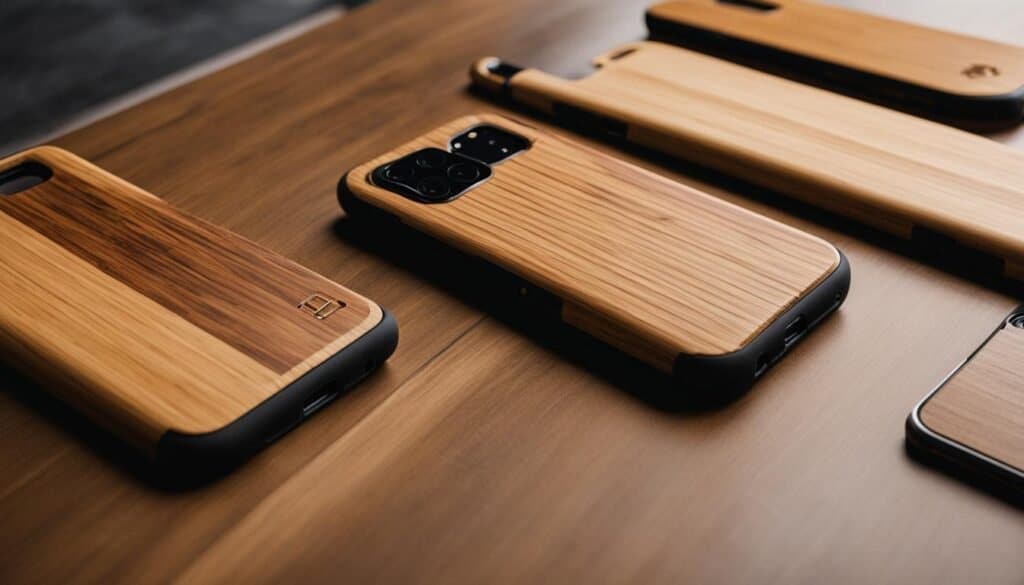
Among the eco-friendly materials gaining popularity in the tech accessories industry, bamboo stands out due to its impressive growth rate, making it a rapidly renewable resource. Bamboo’s inherent properties, such as being lightweight and durable, make it an excellent candidate for crafting stylish phone cases and other sustainable tech accessories. This plant-based pioneer operates within a swift regenerative cycle, requiring no chemical interventions, thus endorsing a green manufacturing paradigm.
MindsetEco: Wood, a time-honored sustainable material, is now being used for smaller household items, including tech accessories, as an eco-friendly alternative to plastic.
By integrating bamboo into phone cases and related tech accessories, brands tap into its natural resilience and environmental benefits, promoting green consumerism and a sustainable lifestyle. Furthermore, the biodegradability factor underscores the product’s compatibility with an eco-conscious end-of-life scenario. Acclaimed for its versatility, bamboo’s integration into tech accessories exemplifies that sustainable practices can coexist effectively with the tech industry’s demands without compromising on functionality or aesthetic appeal.
“Bamboo is the prime example of how sustainable materials can revolutionize the tech industry without sacrificing design or performance.”
Some of the notable sustainable bamboo cases available in the market include:
- Grove Made Bamboo Case
- Evutec Bamboo Case
- Reveal Bamboo Case
The following table outlines a comparison of some popular bamboo phone cases:
| Brand | Model | Compatibility | Notable Features |
|---|---|---|---|
| Grove Made | Bamboo Case | iPhone and Android devices | Hand-sanded for a smooth finish, slim profile |
| Evutec | Bamboo Case | iPhone, Samsung, and Google devices | Aramid Fiber Core for added strength, scratch-resistant coating |
| Reveal | Bamboo Case | iPhone devices | Hybrid design with polycarbonate plastic frame, 1 tree planted for each case sold |
Embracing bamboo as a sustainable material for tech accessories not only contributes to reducing our carbon footprint, but also supports a greener, more environmentally-friendly lifestyle. As the demand for sustainable alternatives continues to grow, the tech industry is poised to make significant strides towards a more eco-conscious and innovative future.
Bioplastics: The Future of Eco-Friendly Tech Accessories
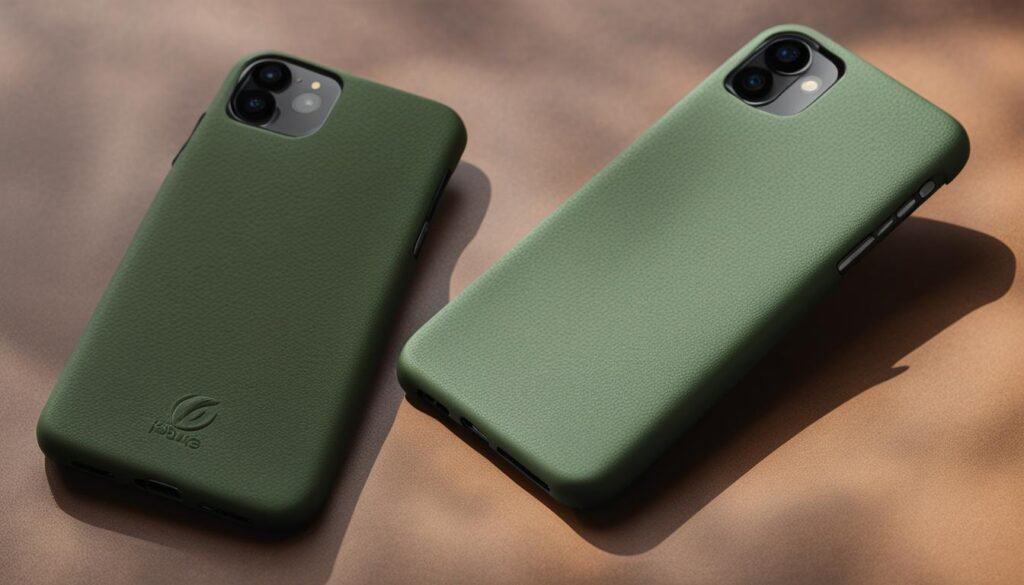
As we move towards a more sustainable future, bioplastics are emerging as a driving force behind eco-friendly tech accessories. With promising innovations in bioplastics, such as corn starch bioplastic and algae bioplastic, the tech industry is transforming the way we perceive and utilize materials in the accessories we use every day.
Innovations in Bioplastics: Corn Starch and Algae
Among the inventive creations leading the charge in bioplastics are corn starch and algae-based materials. These renewable resources showcase the potential to create compostable and biodegradable phone cases, contributing to the evolution of a new class of sustainable products. Brands like Pela and EcoBlvd are becoming pioneers, utilizing plant-based materials to create phone cases that embody eco-friendliness and responsibility.
The use of innovative, renewable resources is changing the way we think about the materials that make up our tech accessories, enabling consumers to be more environmentally conscious in their choices.
Biodegradability and Composting of Bioplastic Phone Cases
What sets bioplastic phone cases apart from traditional plastic alternatives is their ability to break down over time, minimizing their environmental impact. Brands such as Pela and CASETiFY offer eco-friendly phone cases made from bioplastics, designed to compost at the end of their life rather than accumulate as waste. This responsible disposal approach presents a sustainable, planet-friendly solution to the current overuse of non-biodegradable phone cases.
The Role of Bioplastics in Reducing Carbon Footprint
By utilizing bioplastics, tech accessory brands not only limit waste but also actively work to reduce their carbon footprint during production. The sustainable nature of these plant-based materials promotes eco-conscious business practices and contributes to global efforts in combatting climate change.
| Brand | Material | Sustainability Features |
|---|---|---|
| Pela | Bioplastic derived from plant materials | Compostable, reduced carbon footprint |
| EcoBlvd | Corn starch bioplastic | Biodegradable, renewable resources used |
| CASETiFY | Algae bioplastic | Compostable, eco-friendly production processes |
Bioplastics not only redefine the product creation but also embody a commitment to reducing emissions, fostering sustainable consumption, and nurturing an eco-conscious global community. The rise of bioplastic tech accessories is a testament to the increasing demand for responsible and sustainable alternatives that align consumer choices with the protection and preservation of our planet.
Recycled Aluminum: The Metal with Infinite Recyclability
Recycled aluminum, an infinitely recyclable metal, lays the groundwork for an environmentally conscious material choice in tech accessory production. The utilization of recycled aluminum in phone cases and tech gadgets encapsulates the essence of a zero-waste philosophy, where the material can be continuously recycled without loss of quality.
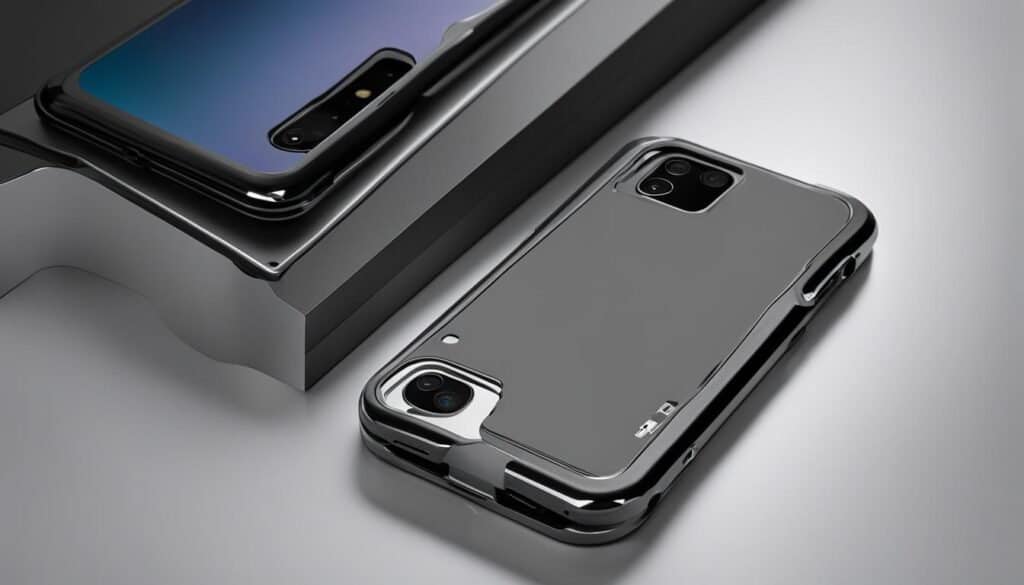
This attribute significantly reduces the reliance on mining and the extraction of new aluminum, hence diminishing the product’s lifecycle impact on the environment. The ecological precedence set by brands employing recycled aluminum resonates with sustainable design principles, championing a move away from disposability towards a future where technology and environmental stewardship harmoniously coexist.
| Brand | Product | Material | Recyclability |
|---|---|---|---|
| Recover | Aluminum Case | Recycled Aluminum | 100% Recyclable |
| Grove | Aluminum Bumper | Recycled Aluminum | 100% Recyclable |
| Carved | Aluminum Wood Case | Recycled Aluminum & Wood | Aluminum: 100% Recyclable, Wood: Biodegradable |
Aluminum cases boast several benefits as eco-friendly tech accessories, such as their durability, lightweight design, and resistance against scratches and drops. The usage of recycled aluminum in such cases seamlessly aligns with the commitment to a sustainable lifestyle while offering a high-quality, functional, and stylish product.
“Every minute of every day, an average of 113,204 aluminum cans are recycled. By using recycled aluminum, we can save 95% of the energy needed to produce aluminum from raw materials, making it the most sustainable choice for tech accessories.”
In conclusion, the infinite recyclability of recycled aluminum represents an ideal sustainable metal choice for those seeking eco-friendly tech accessories. By supporting brands that embrace environmentally conscious materials and sustainable design, consumers actively contribute to the zero-waste philosophy by promoting recycling and lessening the environmental impact tied to technology-related products.
Hemp and Organic Cotton: The Plant-Based Pioneers
Hemp and organic cotton are leading the way towards introducing plant-based materials in the manufacturing of tech accessories. These eco-friendly fibers offer a sustainable alternative to conventional synthetic materials, emphasizing the importance of ethical manufacturing practices. As the demand for sustainable materials for tech accessories grows, these natural textiles emerge as the frontrunners in meeting the environmentally conscious needs of consumers worldwide.
“Hemp and Organic Cotton are revolutionizing the way we think about sustainable materials for technology accessories.”
The cultivation of hemp and organic cotton involves sustainable sourcing that leverages their renewable properties, significantly reducing the dependency on harmful chemicals and excessive water consumption often found in traditional textile industries. The integration of these natural fibers into phone cases and other tech gear not only showcases their versatility but also propels the commitment towards a greener future.
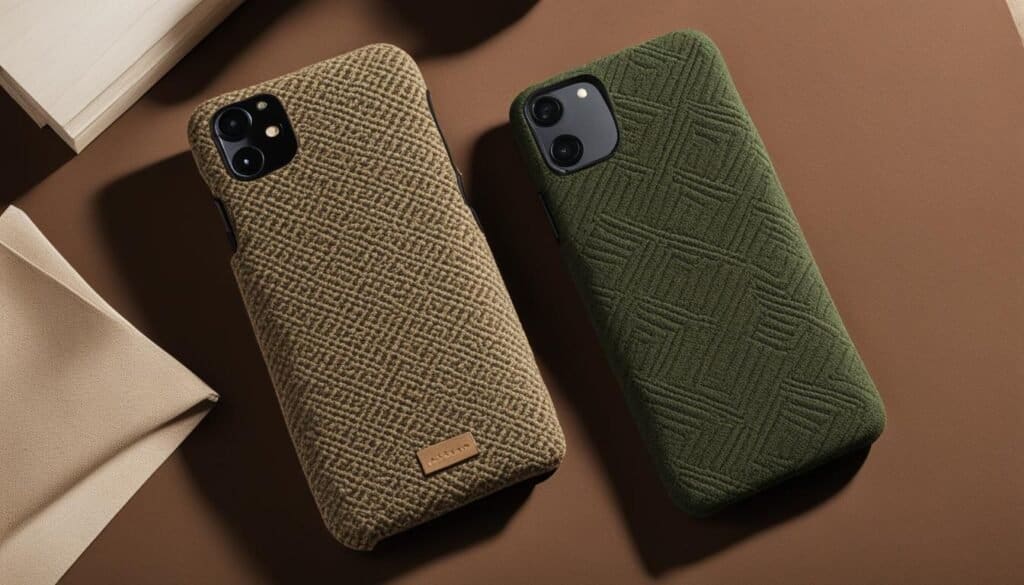
| Material | Sustainability | Eco-friendly Features |
|---|---|---|
| Hemp | Highly sustainable and renewable | Reduced water consumption, minimal chemical use, biodegradable |
| Organic Cotton | Sustainable and renewable | Organic farming practices, reduced chemical inputs, biodegradable |
By incorporating hemp and organic cotton fibers into tech accessories, these plant-based pioneers reinvent the standards for sustainable design, pushing the envelope on how environmentally friendly materials can be effectively utilized in the tech industry. This movement is instrumental in prompting future innovation while aligning tech trends with ecological conservation objectives, ultimately empowering eco-conscious consumers to make responsible choices when it comes to their tech gear.
- Choose sustainable materials for tech accessories: hemp, organic cotton, and other eco-friendly fibers.
- Support brands who champion sustainable sourcing and ethical manufacturing.
- Consider the benefits of renewable resources in creating a greener future for the tech industry.
In conclusion, hemp and organic cotton herald a new era of sustainable tech accessories, driven by the unwavering vision of environmental stewardship. By opting for these plant-based pioneers, consumers play a vital role in supporting ethical manufacturing practices and a sustainable future for the tech industry.
Reclaimed Wood: Upcycling with Elegance
Reclaimed wood emerges as a material of choice for upcycling with a touch of elegance. Merging artisanal craftsmanship with environmental consciousness, reclaimed wood showcases the harmonious balance between technological innovation and natural aesthetics.
How Reclaimed Wood Cases Balance Tech and Nature
Upcycled from diverse sources such as old barns, buildings, and even discarded furniture, reclaimed wood cases personify eco-friendly design. These cases grace tech accessories with unique patterns and a warm, individualistic character, enabling consumers to display their devotion to both style and sustainability. This material choice advocates for repurposing over disposal, steering towards a sustainable decorum where historical wood pieces imbue modern devices with a storied past.
“Reclaimed wood transcends practical functionality by championing a narrative of nature’s resurgence in the realm of tech gear.”
Carved is one such brand that specializes in producing beautiful, sustainable wood cases using reclaimed materials. The artisanal craftsmanship of these cases highlights the eco-friendly ethos embodied by both the brand and the consumer, promoting a shift towards a greener future.
In summary, reclaimed wood is a symbol of unity between tech accessories and nature. It is highly appealingdue to its unique elegance and the message it sends of an eco-conscious lifestyle. As more consumers become environmentally aware and technology continues to evolve, reclaimed wood cases will remain at the forefront of sustainable, stylish, and innovative upcycling solutions.
Beeswax and Soy-Based Waxes: Natural Protection for Your Devices
As eco-conscious consumers seek sustainable ways to protect their devices, beeswax and soy-based waxes emerge as viable organic alternatives to synthetic coatings. These environmentally friendly products offer natural protection for a variety of devices, including laptops, tablets, and smartphones, as they provide eco-friendly device protection that aligns with your green lifestyle.
Both beeswax and soy-based waxes boast inherent properties that ensure reliable protection. They exhibit moisture resistance and durability, defending your devices against daily wear and tear. In contrast to traditional coatings, these sustainable coatings are made from organic materials that reduce the harmful environmental impacts associated with conventional synthetic finishes.
“Beeswax and soy-based waxes offer an eco-friendly shield with non-toxic finishes, easing consumers’ concerns about environmental and health impacts.”
By choosing these biodegradable waxes, you contribute to a greener future and promote earth-friendly initiatives. These non-toxic finishes are tailored to support sustainability, exhibiting a low ecological footprint throughout their lifecycle – from production to disposal. This commitment to environmentally friendly products encourages a broader adoption of sustainable practices in the tech industry.
| Material | Benefits |
|---|---|
| Beeswax | Natural, biodegradable, non-toxic, moisture resistant, durable |
| Soy-Based Wax | Eco-friendly, renewable, non-toxic, durable, easy to apply and remove |
As consumers increasingly prioritize a greener way of living, the support for beeswax and soy-based waxes in device protection offers an environment-conscious solution. By embracing these sustainable, organic, and biodegradable alternatives, you can take a step towards reducing your ecological impact and preserving our planet for future generations.
Conclusion on Sustainable Materials for Tech Accessories
In our exploration of sustainable materials, it has become abundantly clear that environmentally friendly tech accessories are no longer just a trend but an essential shift towards green technology. Adopting eco-conscious choices enables us to balance our love for technology with the need for sustainable living, and ultimately has a significant impact on the environment. As the future of sustainability depends on our collective efforts, brands and individuals must join hands in supporting innovation and green consumerism.
The wide array of sustainable materials, from compostable bioplastics to recycled aluminum and renewable resources like bamboo, demonstrates the tech industry’s commitment to ecological responsibility. By prioritizing environmentally positive solutions, we can create a ripple effect that encourages other industries to follow suit. Brands such as Pela, CASETiFY, and EcoBlvd have already proven that sustainability and functionality can coexist within the tech accessory space, and their success serves as an example for others to follow.
Moving forward, it is crucial for both consumers and manufacturers to continue advocating for sustainable practices and eco-friendly alternatives in the tech industry. As we embrace this paradigm shift, we are not only investing in the well-being of our planet but also ensuring a brighter, more eco-efficient future for generations to come.
FAQ on Recycled Materials for Tech
Q: What are some popular eco-friendly phone accessories and tech materials?
A: Some popular eco-friendly phone accessories and tech materials include Pela cases, Organicore, Incipio, and wireless chargers made from sustainable materials.
Q: How can tech accessories and phone cases be more sustainable?
A: Tech accessories and phone cases can be more sustainable by being made of recycled materials, using energy-efficient production processes, and having reusable and compostable features.
Q: What are the top picks for sustainable materials in phone cases?
A: The top picks for sustainable materials in phone cases include those made from recycled plastic, organic materials, and blends of sustainable materials that reduce environmental impact.
Q: How do eco-friendly phone accessories contribute to sustainability goals?
A: Eco-friendly phone accessories contribute to sustainability goals by reducing energy use, minimizing waste, and promoting the reuse of materials, thus helping to reduce the environmental burden of old tech ending up in landfills.
Q: Are there phone cases made with 100% recycled materials?
A: Yes, there are phone cases made with 100% recycled materials, such as those made from recycled plastic or other sustainable materials that are repurposed for use in new devices and accessories.
Q: What is the environmental impact of traditional phone cases?
A: Traditional phone cases made from non-sustainable materials contribute to the accumulation of millions of metric tons of waste in landfills, increasing energy use, and causing environmental harm due to their non-biodegradable nature.
Q: How do sustainable phone cases provide a grip to your phone?
A: Sustainable phone cases provide a grip to your phone through innovative design and use of sustainable materials that offer both protection and functionality, making them eco-friendly and practical choices for consumers.
Q: Are there eco-friendly phone accessories available for specific smartphone models?
A: Yes, there are eco-friendly phone accessories available for smartphones including iPhone, Samsung Galaxy, Google Pixel, and other popular models, offering sustainable options for a wide range of users.
Q: How do sustainable tech materials save energy compared to traditional ones?
A: Sustainable tech materials save energy compared to traditional ones by being made with recycled or energy-efficient production processes, thus reducing consumption and promoting the use of renewable resources for a more sustainable approach to tech accessory production.
Q: What is the significance of using eco-friendly products and packaging for phone accessories?
A: Using eco-friendly products and packaging for phone accessories significantly reduces the environmental impact of the products, promotes sustainable consumption, and supports the commitment to achieve sustainability goals in technology and consumer goods industries.

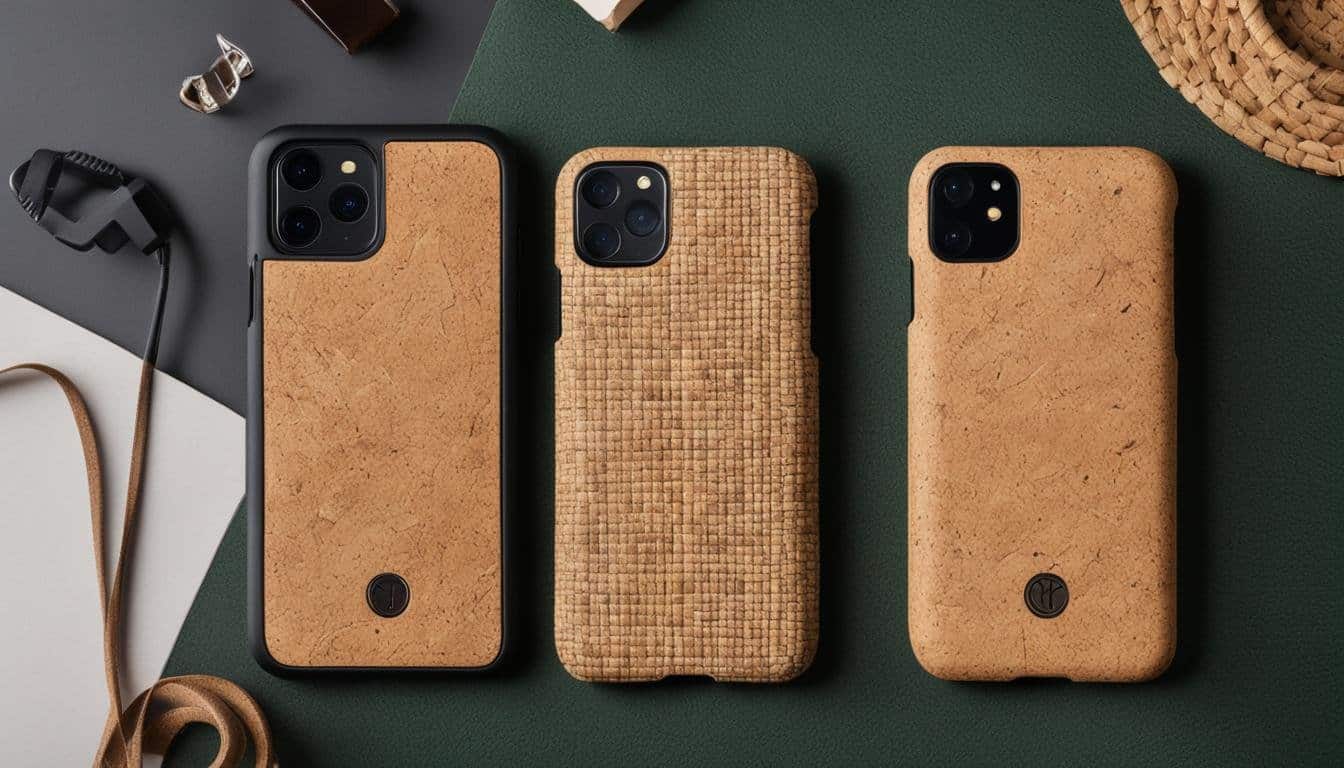


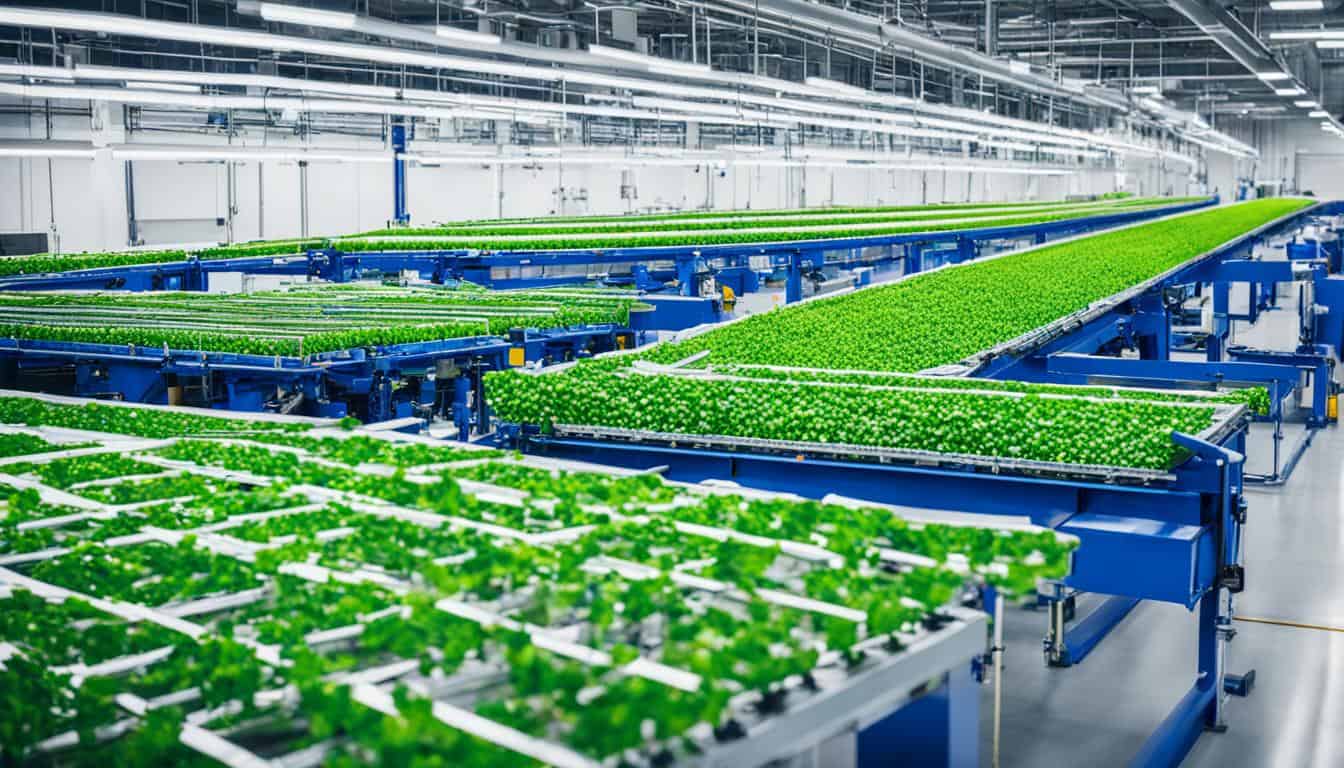
Leave a Reply